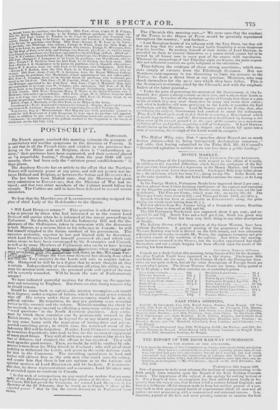" Will Lord DURHAM return?" This question is asked many
times a day at present by those who feel interested as to the course Lord DURHAM will pursue when he is informed of the recent proceedings in Parliament. No doubt, he will feel the Indemnity Bill and the dis- allowance of the Ordinances, taken in connexion with the discussion in both Houses, as a serious blow to his influence in Canada : he will find himself crippled in the future conduct of his government. The extensive authority, superior to law and limited only by discretion, which Lord DURHAM believed himself possessed of--and which vain notion seems to have been encouraged by his Socretaries and Council, as well as by some Members of Parliament who oat slit to have known better •-will shrinl int anterid.diandnerasjoils when excomiagLin strict accor rime wit t njsimmtmusl urn..isa:Sir 1.1(.0 1..1,4AL4201. 2.07;:proeiso. Perhaps the Governor-General has already done other acts that the Tory majority in the Lords will rule to require indem- nity. Hampered he will be to a degree that he never thought of, that is certain. Independently of considerations affecting his ability to ex- ecute his mission with success, the personal pride and spirit of the man will he severely wounded. Will he brook the vote of Parliamentary censure?
We have indicated powerful motives for throwing up the appoint- ment and returning to England. But there are also strong reasons why he should remain.
Should he come back re ieftehi-his mission incomplete-it would be in disgrace, under a stigma of failure, which he might never entirely wipe off. His return under these circumstances would be akin to political suicide. By remaining, he may yet perform some essential service to this country and the colony. Notwithstanding the check he has received, he may succeed in effecting a temporary settlement of the "vexed questions" in the North American provinces. Any settle. ment by which these countries can be permanently secured to the British crown, we believe to be beyond his or any mortal power; but be may come home with the reputation of having done mid recom- mended something great ; in which case, the untoward event of the Indemnity Bill will be forgotten. IL sides, Lord li rattan is surrounded by numerous dependents, who look to him for the continued enjoyment of many good things. They will all with one voice entreat hirn to set his foes at defiance, and stomach the affront he has received. They will work upon his good-nature. Then, no doubt, he will be soothed by sub- missive letters from his Whig friends in England ; who will plead their inability to withstand the. Lords, and point to the noble defence made for him in the Commons. The trembling speculators in land and timber will address him as the only man who could save the colony, and assure him that there is but one opinion as to the factions rind spiteful motives of Lord BROUGHAM and his hackers. It is conceiv- able that, by these representations and assurances, Lord Dunfiast may be prevailed upon to continue in Canada.
• In this week of retrospections we may remind our readers that we never spoke of the Dictatorbhip in the iiigh.flown phrases of the time. And when the Canada Bill had passed the Commons, we warned Lord Du ii ri a )1, in tl:e Spectator of the 31 February, that he would go to Canada " .shorn rf his
sxpected power :" that he did, the recent discussions in Parliament have shown.
The Chronicle this morning says-" We were sure that the conduct of the Tories in the House of Peers would be generally reprobated throughout the country," and further- " Lord Brougham boasts of his influence with the Tory Peers, but they will find ere long that the noble and learned lord's friendship is more dangerous than his hostility. By availing himself of their dislike of Lord Durham, be prevailed on them to commit themselves to a course which cannot fail to be viewed by all honest men in every part of the empire with reprobation. Wherever the proceedings of last Thursday night are known, the most respect- able and influential journals are quite indignant at the exhibition." Then follows the evidence of these strong assertions; which con- sists simply of extracts from the Edinburgh Scotsman. But our Northern contemporary is too discerning to limit his censure to the Tories : he deals a direct blow at our precious 'Ministers, who may thank themselves for the mess into which they have fallen. This is the Scotsman's testimony, cited by the Chronicle, and with the emphatic Italics of the latter journal- " Under the guise of protecting the servants of the Government, it (the in- demnity Act) passes a strong censure on their arts, and weakens their hands in the province. It teaehes all the turbulent spirits of Canada that there is a pier in law of which they may avail themselves to annoy and resist their rulers; and, what is doubtless still more gratifying to the Lords, it mortifies the Earl of 1/tub:tin and the Ministers. Lord Melbourne stated on Friday, that, after emisidering the sullieet, Government had resolved to annul the ordinances. Thus Lord Darh;ras is made to feel that he is wring a Government which is unable torratect hint ; and the Garernment is haneiliatcl by having a Iris filny error of its Ramat pararb,r1 in the cyrs of the country as a mouttranut riutalion tur and justice, requiring a bill of indemnify. If Lord Durham should throw up his thankless office in disgust. aid Canada fall again into a state of confusion, the triumph of the Lords would be eomplete."


























 Previous page
Previous page